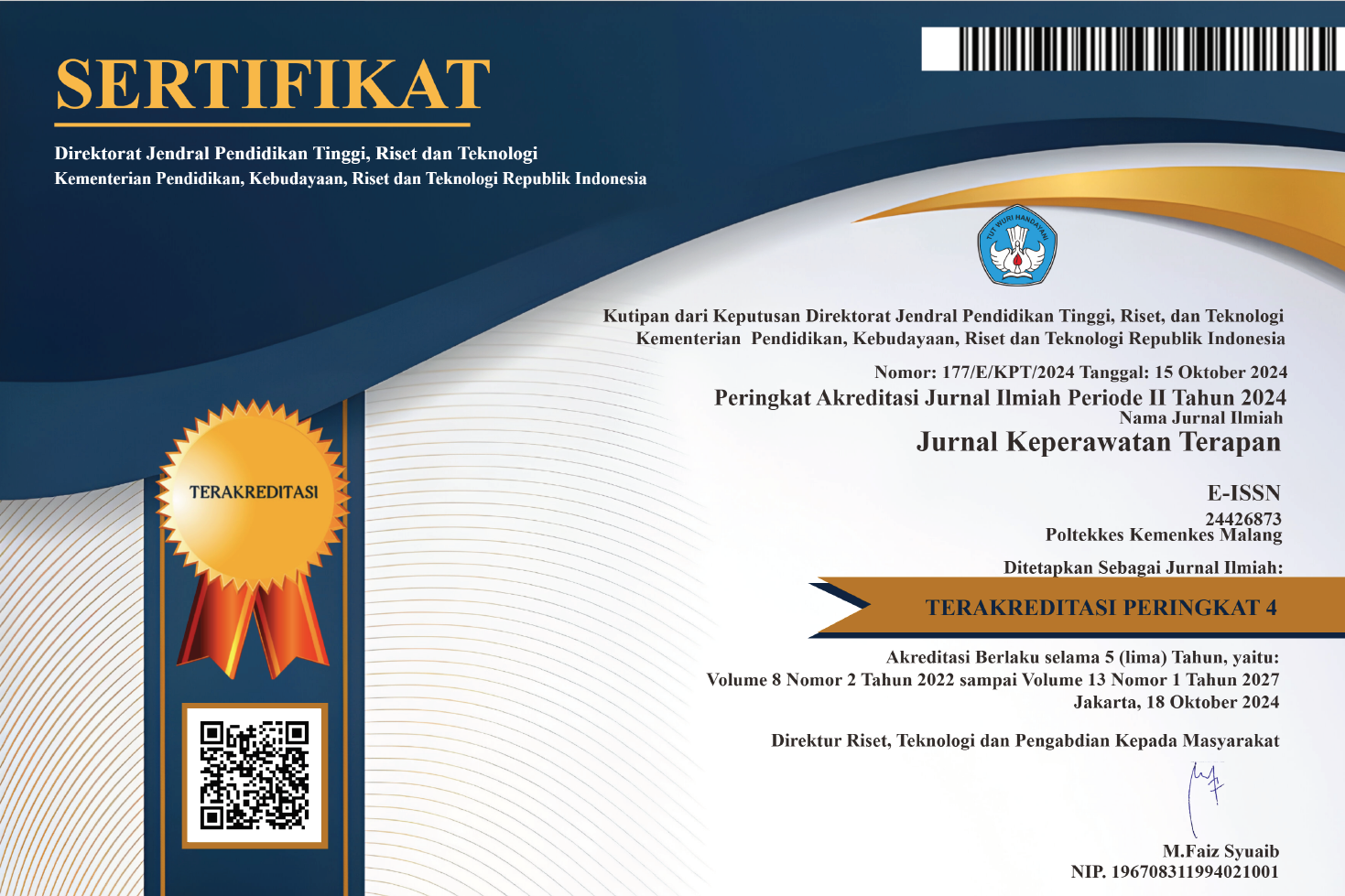KENDALA DALAM PEMBERIAN ASI EKSKLUSIF PADA IBU BEKERJA: STUDI KUALITATIF
KENDALA DALAM PEMBERIAN ASI EKSKLUSIF PADA IBU BEKERJA: STUDI KUALITATIF
DOI:
https://doi.org/10.31290/jkt.v8i2.3717Keywords:
breastfeeding, experience, women’s employmentAbstract
Abstract: Breastfeeding is the best way to meet the nutritional needs for the growth and development of infants. Breastfeeding plays a role in cognitive, sensory, motor development and protection against infections and chronic diseases, but various obstacles are still found in the community. The study focused on the experience of ineffective breastfeeding among working mothers in Pucangsongo Village. Design of this study was Qualitative research with a phenomenological approach. Data was collected by interviewing five nurses and observing data in the field to obtain primary data and reviewing Pucangsongo Polindes documents to obtain secondary data. Triangulation of research data is done by triangulation of sources and methods. Data analysis through the stages of data reduction, data display, and drawing conclusions and notifications. Results of this study were obstacles faced by working mothers who experience problems with ineffective breastfeeding include the availability of advice and infrastructure for breastfeeding in the workplace. Failure to breastfeed for working mothers, namely busyness during work or company policies that are not cooperative in providing sufficient time for mothers to express breast milk. Health workers such as midwives also affect the experience of ineffective breastfeeding. Health workers have a very important role in protecting, promoting, and supporting breastfeeding businesses and must be seen in terms of their broad involvement in social aspects.
Keywords: breastfeeding, experience, women’s employment
References
Akadri, Adebayo, and Oluwaseyi Odelola. 2020. “Breastfeeding Practices among Mothers in Southwest Nigeria.” Ethiopian Journal of Health Sciences 30(5):697–706. doi: 10.4314/ejhs.v30i5.8.
Al?Katufi, Batool Ali, Maymoona Hussain Al?Shikh, Rawan Fawzi Al?Hamad, Abdulmohsin Al?Hajri, and Abdullah Al?Hejji. 2020. “Barriers in Continuing Exclusive Breastfeeding among Working Mothers in Primary Health Care in the Ministry of Health in Al-Ahsa Region, Saudi Arabia.” Journal of Family Medicine and Primary Care | 9(2):957–72. doi: 10.4103/jfmpc.jfmpc_844_19.
Amil Dias, Jorge, Edmundo Santos, Inês Asseiceira, Sylvia Jacob, and Carmen Ribes Koninckx. 2022. “The Role of Infant Formulas in the Primary Prevention of Allergies in Non-Breastfed Infants at Risk of Developing Allergies–Recommendations from a Multidisciplinary Group of Experts.” Nutrients 14(19):4016. doi: 10.3390/nu14194016.
Anggraeni, Mekar Dwi, Busakorn Punthmatharith, and Wongchan Petpichetchian. 2020. “A Causal Model of Breastfeeding Duration among Working Muslim Mothers in Semarang City, Central Java Province, Indonesia.” Walailak Journal of Science and Technology 17(9):1010–23. doi: 10.48048/wjst.2020.5406.
Cervera-Gasch, Águeda, Desirée Mena-Tudela, Fatima Leon-Larios, Neus Felip-Galvan, Soukaina Rochdi-Lahniche, Laura Andreu-Pejó, and Víctor Manuel González-Chordá. 2020. “Female Employees’ Perception of Breastfeeding Support in the Workplace, Public Universities in Spain: A Multicentric Comparative Study.” International Journal of Environmental Research and Public Health 17(17):1–14. doi: 10.3390/ijerph17176402.
Chekol, Dawit Alemayehu, Gashaw Andargie Biks, Yalemzewod Assefa Gelaw, and Yayehirad Alemu Melsew. 2017. “Exclusive Breastfeeding and Mothers’ Employment Status in Gondar Town, Northwest Ethiopia: A Comparative Crosssectional Study.” International Breastfeeding Journal 12(1):1–9. doi: 10.1186/s13006-017-0118-9.
Chen, Jiawen, Tong Xin, Junjian Gaoshan, Qiuhong Li, Kaiyue Zou, Shihui Tan, Yuhan Cheng, Yuning Liu, Jingyi Chen, Hanyu Wang, Ying Mu, Li Jiang, and Kun Tang. 2019. “The Association between Work Related Factors and Breastfeeding Practices among Chinese Working Mothers: A Mixed-Method Approach.” International Breastfeeding Journal 14(1):1–13. doi: 10.1186/s13006-019-0223-z.
Coo, Soledad, Maria Ignacia García, Andrea Mira, and Verónica Valdés. 2020. “The Role of Perinatal Anxiety and Depression in Breastfeeding Practices.” Breastfeeding Medicine 15(8):495–500. doi: 10.1089/bfm.2020.0091.
Green, Mackenzie, Alissa M. Pries, Dian N. Hadihardjono, Doddy Izwardy, Elizabeth Zehner, and Victoria Hall Moran. 2021. “Breastfeeding and Breastmilk Substitute Use and Feeding Motivations among Mothers in Bandung City, Indonesia.” Maternal and Child Nutrition 17(3):1–13. doi: 10.1111/mcn.13189.
Junarti, Desti, Bambang Budi Raharjo, and Ratna Rahayu. 2020. “Role Factors That Affecting Non Exclusive Breastfeeding (Qualitative Study At Pegandan Health Center).” Public Health Perspectives Journal 5(2):2020–2119.
Kementerian Kesehatan Republik Indonesia. 2021. Prosentase Bayi Kurang 6 Bulan Yang Mendapat ASI Eksklusif Menurut Provinsi. Jakarta.
Lassi, Zohra S., Fahad Rind, Omar Irfan, Rabia Hadi, and Jai K. Das. 2020. “Impact Od Infant and Young Child Feeding (IYFC) Nutrition Interventions on Breastfeeding PRactice, Growth and Mortality in Low-and Middle-Income Countries?: Systematic Review.” Nutrients 12.
Mahmud, Nur Ulmy, Tahir Abdullah, A. A. Arsunan, Burhanuddin Bahar, Veni Hadju, Masyita Muis, and Sri Sumarmi. 2019. “Determinants of Exclusive Breastfeeding in 6 Months Old Infant in Jeneponto District.” Indian Journal of Public Health Research and Development 10(10):1487–92. doi: 10.5958/0976-5506.2019.03047.X.
Piankusol, Chanodom, Wachiranun Sirikul, Krongporn Ongprasert, and Penprapa Siviroj. 2021. “Factors Affecting Breastfeeding Practices under Lockdown during the Covid-19 Pandemic in Thailand: A Cross-Sectional Survey.” International Journal of Environmental Research and Public Health 18(16). doi: 10.3390/ijerph18168729.
Pradanie, Retnayu, Aria Aulia Nastiti, and Thaliah Jihan. 2019. “Analysis of Factors Related to the Mother’s Behavior to Increase Breastmilk Production.” Indian Journal of Public Health Research and Development 10(8):2642–47. doi: 10.5958/0976-5506.2019.02267.8.
Rapingah, Siti, Nova Muhani, Besral, and Poppy Yuniar. 2021. “Determinants of Exclusive Breastfeeding Practices of Female Healthcare Workers in Jakarta, Indonesia.” Kesmas 16(1):59–65. doi: 10.21109/KESMAS.V16I1.2715.
Sulaiman, Zaharah, Pranee Liamputtong, and Lisa H. Amir. 2018. “Timing of Return to Work and Women’s Breastfeeding Practices in Urban Malaysia: A Qualitative Study.” Health and Social Care in the Community 26(1):48–55. doi: 10.1111/hsc.12460.
Tsai, Su Ying. 2022. “Shift-Work and Breastfeeding for Women Returning to Work in a Manufacturing Workplace in Taiwan.” International Breastfeeding Journal 17(1):1–9. doi: 10.1186/s13006-022-00467-8.












